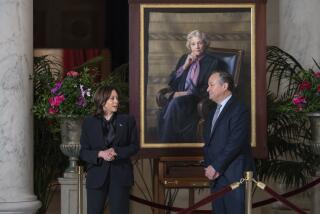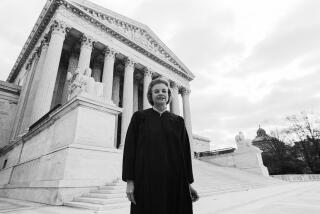Without Great Expectations, Ginsburg Found Her Way to Top : The ability of Clinton’s Supreme Court nominee to overcome traditional barriers could shape her judicial role.
- Share via
WASHINGTON — Perhaps nobody is as surprised by Ruth Bader Ginsburg’s appointment to the U.S. Supreme Court as the nominee herself.
Ginsburg, despite her keen intellect, did not seem marked for success. She was born into a lower middle-class Jewish family in Brooklyn’s Flatbush section during the Great Depression. Her mother died when she was a teen-ager. Her haberdasher father could afford to give her few opportunities.
Even after she graduated from Columbia Law School at the top of her class in 1959, because she was a woman she could not find a job with any New York law firm or a clerkship at the Supreme Court.
When a friend took her arm recently as they left a movie theater during a rainstorm, he joked that he had never expected to be escorting a future Supreme Court justice. “I never expected to be a Supreme Court justice,” Ginsburg replied earnestly.
But even if she did not anticipate being nominated as the second woman to serve on the nation’s highest court, Ginsburg certainly did more to write her own success story than many others who have risen to the top.
She not only excelled at the law, carving out a brilliant career as a legal scholar and jurist, but also was instrumental in changing the societal norms that once prevented women like her from achieving their goals. Because she successfully challenged gender-based laws during the 1970s, she is revered by many American women as a modern feminist heroine.
Ginsburg’s ability to overcome traditional barriers herself and her success in creating real opportunity for others are qualities that are expected to shape her role on the Supreme Court. In particular, as Eleanor Holmes Norton, the Democratic delegate to Congress from the District of Columbia, put it, “Ruth Ginsburg’s roots are deep in the Bill of Rights.”
“She has a deep understanding of the second-class citizenship that many people have experienced,” said Susan Deller Ross, a law professor at Georgetown University who worked closely with Ginsburg on gender issues in the 1970s. “It’s good to have that kind of experience on the court because for most of the people there life has just handed them one plum after another.”
Yet, while Ginsburg’s work on behalf of women’s rights has invited comparisons to the civil rights advocacy of the late Justice Thurgood Marshall, legal scholars insist she is no female Thurgood Marshall.
In the 13 years since she was named to the U.S. Appeals Court by President Jimmy Carter, she has been a dogged judicial centrist, even forging strong personal bonds with such conservatives as Associate Justice Antonin Scalia and former Judge Robert H. Bork. On issues such as gay rights or affirmative action, she often has written separate opinions that resolved cases on narrow grounds and avoided ideology.
Even the feminists who admire her early work on behalf of women’s rights fear she may be inclined to compromise elements of the 1974 Roe vs. Wade decision that established a woman’s right to an abortion. In a speech at New York University earlier this year, she surprised many listeners by suggesting that Roe was too broad.
In her personal style, Ginsburg projects a stern demeanor. A portrait done of her at Columbia Law School was so severe that she asked to have it removed a few years after it was unveiled.
Her dark hair is always pulled tightly into a knot at the back of her neck. Her clothes are crisply conservative. She seldom smiles and almost never laughs. Her words are always precisely measured.
It is as if Ginsburg, over the years, has intentionally obliterated all evidence of the breezy, beautiful baton-twirler who was known as “Kiki” Bader when she attended James Madison High School in Brooklyn in the 1950s.
Friends say her toughness is a byproduct of a lifelong quest to be taken seriously. By her own admission, she is haunted by memories of her late mother, whose intellectual gifts were not allowed to flourish in a male-dominated society.
There is just one thing that cracks Ginsburg’s hard shell: her family.
Married to her college sweetheart, Martin D. Ginsburg, one of the nation’s leading tax lawyers, she has two grown children, Jane and James. And like many grandmothers, she dotes on Jane’s two youngsters, Paul and Clara, often to the exclusion of other guests visiting in her two-story apartment in the Watergate complex.
Martin Ginsburg, who is both a Georgetown professor and associated with the firm of Fried, Frank, Harris, Shriver & Jacobson, has long been a tax adviser to Texas billionaire Ross Perot. Jane teaches copyright law at Columbia University. And James is a classical record producer who also has been studying law at the University of Chicago.
Ginsburg’s husband attended Harvard Law School at her urging and she followed him there after graduating with honors from Cornell in 1954 and getting married. When he accepted a job in New York City, she transferred to Columbia for her final year of law school.
Even though she excelled in school, some classmates recall that Ginsburg was never as confident as she might have been of her abilities. Her ambition was born more of an intellectual curiosity than a passion for success. It was not until later in life that she would come to view herself as a feminist.
Motherhood never deterred her. Her daughter, who was born while Ginsburg was in law school, often played nearby as mother worked on the law review.
Marriage brought her the financial security she lacked as a child. Her husband comes from a wealthy Long Island family, and the two of them have invested wisely. Today, they have assets in excess of $6 million.
While Ginsburg often recounts her early experiences in encountering sexual bias, friends say she tells these stories more as object lessons than as complaints. “I have never sensed any anger or bitterness in her about it,” said Ross.
Ginsburg was not surprised when no law firm would hire her out of law school. “In the Fifties,” she later wrote, “the traditional law firms were just beginning to turn around on hiring Jews. But to be a woman, a Jew and a mother to boot--that combination was a bit too much.”
As a volunteer attorney for the American Civil Liberties Union in the 1970s, Ginsburg was responsible for litigating 20 cases that succeeded in tearing down many gender-based laws. Among them were laws that dictated unequal treatment in jury service and Social Security benefits.
Ginsburg argued many of these cases before the high court, overcoming her innate shyness to make persuasive presentations. Although she has been credited with a brilliant strategy for litigating small, incremental cases, those who were with her at the ACLU’s Women’s Rights Project at the time say she simply took the cases that were available.
At the heart of her litigating strategy was the notion that men and women ought to be viewed as equal, and that men suffer as much discrimination as women under a system that treats women as a special class.
It is a view that Ginsburg, being as capable as any male lawyer she ever met, came to naturally. It was also something she learned from her mother, Celia Bader.
With her succeess in arguing before the Supreme Court, Ginsburg aspired to be solicitor general of the United States. But she was denied that job in 1977 when Carter took office, and was nominated to the appeals court only in the final days of his presidency in 1980.
Liberals have been disappointed by Ginsburg’s record on the appeals court. A computer study of 1987 cases showed her voting more consistently with Republican appointees than with Democrats.
Some critics have suggested that her close friendships with conservative jurists have colored her opinions. The Ginsburgs socialize regularly with the Scalias, and other guests recall Justice Scalia playing “It’s A Grand Old Flag” on the Ginsburg piano shortly after the Supreme Court ruled in a controversial flag burning case.
But admirers say Ginsburg’s appeals court record reflects her sense of professional caution and reverence for precedent--not a shift to the right. Despite her criticism of Roe, she has told friends she firmly favors women’s rights to abortion.
On the Supreme Court, legal scholars predict, Ginsburg’s experience as a litigator is certain to make her sensitive to issues of individual rights, but her fondness for collegiality and her careful nature are likely to continue to draw her to the political center.
More to Read
Get the L.A. Times Politics newsletter
Deeply reported insights into legislation, politics and policy from Sacramento, Washington and beyond. In your inbox twice per week.
You may occasionally receive promotional content from the Los Angeles Times.









